|
W.D. COCKER (1882 – 1970)
W. D. Cocker was a Scottish poet who wrote in both
Scots and English. In the First World War, Cocker served with the
Highland Light infantry, and was taken prisoner in 1917. His war poetry
is interesting and includes the poems "Up the Line to Poelkapelle", "The
Sniper" and a five-part sonnet cycle entitled "Sonnets in Captivity".
However, he is best known for his humorous poems in Scots.
BRIEF AUTOBIOGRAPHY: 6th of
April, 1959
My full name is William Dixon Cocker, and I was
born on 13th October, 1882, in the town of Rutherglen, not far from
Glasgow. We moved into the latter city when I was about seven years of
age, and it has been my home town since then.
Needless to say, my knowledge of
the Scots tongue does not come from these industrial areas. My mother’s
people were farmers in the parish of Drymen, near Loch Lomond, where
they had owned the adjacent farms of Drumbeg and Wester Drumquhastle for
some centuries. We had a house on their land, a small cottage which we
used as a holiday home and a place for week-ends. We were a large
family, and it seemed more like a home to us than the circumscribed
city. We were all much attached to it.
The rural folk, the workers on
the land with whom I was acquainted there, all spoke in good Scots, such
as you do not hear in the city nowadays. So I did not learn my Doric
from dictionaries.
Before I was l3 I left school at my own urgent
request and went into my father’s business: he sold office stationery
and did printing, book-binding, etc., but this was a dwindling concern,
and before I was out of my teens I discovered that there was no future
in it for me. I tried a few other things, including free-lance
journalism, and when I was 23 I got a job with a Glasgow morning paper,
"The Daily Record". With this paper and its associate the "Glasgow
Evening News" I was to work for 51 years.
The only change from this was
during the war of 19l4 when I enlisted in the 9th H.L.I. (the Glasgow
Highlanders.) My military career was not distinguished, though some of
my best poems in English were written then. I rose to the rank of Lance
Corporal (paid). In 1917 I was transferred to the 15th Royal Scots and
in the same year was taken prisoner at the beginning of the
Passchendaele offensive, more dead than alive. I worked in Germany at a
variety of jobs: in the woods, navvying on the roads, and on a farm. The
last, though I understood it best, was the one I liked least. Gathering
potatoes or forking manure were backbreaking jobs; and I was ill during
all the 14 months of my captivity.
I had two brothers killed during
the war, and my parents died then, all within the space of two years.
When I got back to Glasgow I felt I had nothing to return to; I spent my
first night in a soldiers’ hostel. I went back to my "Daily Record" job
and, in due course, got married and lived happily ever after.
I have written a lot of one-act
plays and a few full length ones. A list of some of them is given at the
beginning of my "Random Rhymes and Ballads." My most successful one-act
is "The Wooin’ O’t" which has been translated into English, French and
Gaelic and performed and broadcast a great many times. I was dramatic
critic for my paper for about 20 years, especially dealing with amateur
drama.
I have written a few serials and a number of short stories some of which
dealing with the West Highlands were collected in book form and
published under the title of "Brave Days of Old" (Now out of print.) I
had two illustrated books published by Blackie, one dealing with the
topography and history of Loch Lomond and the Trossachs and the other
with the Firth of Clyde.
My first three books of verse: "The Dreamer", "Dandie",
and "The Bubbly-jock" are out of print but all that was worth preserving
in them is to be found in my "Poems, Scots and English".
When the
"Glasgow Evening News" ceased publication two years ago I retired, I
thought that at 74 I had worked long enough. I am now enjoying my
leisure, reading a lot and watching plays on T.V.
I still go out to Drymen
occasionally to see the hills and my relatives, the younger generation.
Not a very interesting life perhaps, but that’s all there is to it.
(W.D. C)
Transposed Data from Official Records
********************************************
MARRIAGE:
JAMES COCKER (Father of William Dixon Cocker in
1882)
Spouse: ISABELLA
GIFFORD JAGO
Date &
Place: 24 AUG 1869 Govan, Lanark, Scotland
Old Parish Record
***********************************************************
1871 Scotland Census
Name: James Cocker
Age: 31
Estimated birth year: 1840
Relationship: Head
Spouse's name : Isabella Gifford
Jago
Gender: Male
Where born: Glasgow, Lanark
Registration district:
Tradeston
Civil parish:
Glasgow Govan
County:
Lanarkshire
Address: 277
Eglinton St
Occupation:
Stationer
Household
Members
James Cocker 31
Isabella G Cocker 18 born
Glasgow
Anne J Cocker 5
Months born Glasgow
*********************************************
Death: 1878 ISABELLA (GIFFORD JAGO) COCKER, aged 25
years in GORBALS, GLASGOW.
************************************************************************************
1881 Census Place: Govan, Lanark, Scotland
Dwelling: 385 Eglinton Street
James COCKER, Head,
(Stationer),Widower, aged 41, born in Glasgow, Lanark, Scotland
Margaret COCKER, Daughter, aged 8 born Glasgow,
Lanark, Scotland
Isabella
G. COCKER, Daughter, aged 2, born Glasgow, Lanark, Scotland
Jeanie Miller GOW Spinster, House Keeper, aged 29,
born Drymen, Stirling, Scotland
************************************************************************************
MARRIAGE:
13th January, 1882 at 10 Kenmure Street,
Pollokshields, Glasgow
James Cocker (Master Stationer), Widower, aged 41 years
and Jeanie Miller Gow (Housekeeper), Spinster, aged
29 years
************************************************************************
BIRTH:
William Dixon Cocker, 13th October, 1882, Drumbeg
Cottage, Gallowflat, Rutherglen, Glasgow
***********************************************************************************
1891 Scotland Census
Name: James Cocker
Age: 51
Estimated birth year: 1840
Relationship: Head
Spouse's name : Jeanie M
Gender: Male
Where born: Glasgow, Lanarkshire
Registration district:
Kelvin
Civil parish:
Glasgow Barony
County:
Lanarkshire
Address: 189
Pitt St
Occupation:
Stationer
Household
Members:
James Cocker 51
Jeanie M Cocker 39
Annie Cocker 20 Daughter b.
Glasgow
Bella Cocker 12
Daughter b. Glasgow
William Cocker 8 Son b. Rutherglen
Kate Cocker 6 Daughter b. Rutherglen
James Cocker 5 Son b. Rutherglen
Alexander Cocker 3 Son b. Rutherglen
Norman Cocker 7 Weeks Son b. Glasgow
*************************************************
1901 Scotland Census
Name: James Cocker
Age: 61
Estimated birth year: 1840
Relationship: Head
Spouse's name : Jeannie
Gender: Male
Where born: Glasgow, Lanarkshire
Registration district:
Kelvin
Civil parish:
Glasgow Blythswood
County: Lanarkshire
Address: 189 Pitt Street
Occupation: Stationer
Household Members: Name Age
James Cocker 61
Jeannie Cocker 48
Annie Cocker 31 Daughter b. Glasgow
Isabella Cocker 22 Daughter b. Glasgow
William Cocker 18 Son b. Rutherglen
Kate Cocker 16 Daughter b. Rutherglen
James Cocker 15 Son b. Rutherglen
Alexander Cocker 13 Son b. Rutherglen
Norman Cocker 10 Son b. Glasgow
**********************************************
WAR YEARS
*********************************************
MARRIAGE:
5th July, 1929 in Trinity United Free Church,
Johnstone, Renfrew, Scotland
William Dixon Cocker (Book-Keeper) Bachelor aged 46
years
and
Margaret Davids Paterson (Schoolteacher) Spinster
aged 45 years
*******************************************************************
DEATH:
William Dixon COCKER in Glasgow in 1970, aged 87
years.
*********************************************************************
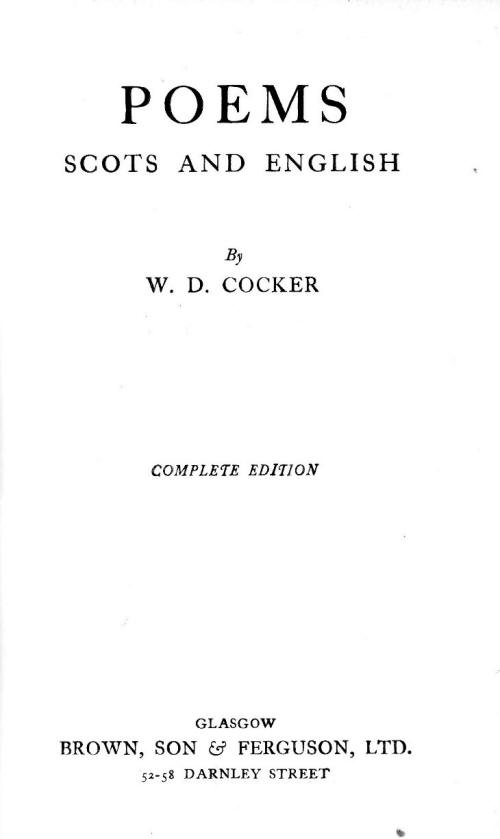
FOREWORD
In issuing this collected edition of my poems I no
apology for the preponderance of humour in the volume. As Synge, the
Irish dramatist, has said: "Of the things which nourish the imagination,
humour is the most needful."
I am in hopes that the
popularising of these verses of Scottish rural life may help to keep
alive vernacular speech, which is so apt to be forgotten in our cities
and industrial centres to-day.
In the writing of Scots poetry I
have always maintained that the idiom is of equal importance to the
vocabulary. In this I differ from many modern writers, who disregard the
idiom entirely, and use a vocabulary, garnered from John o’ Groats to
Galloway, which would sound foreign in any locality. In the main, my
Scots is the speech that I was familiar with as a boy in Strathendrick;
and I seldom use a word that would not come as readily to my tongue as
to my pen.
For the convenience of those readers whose knowof
our vernacular is slight I have been asked to add a glossary to this
book, A complete glossary, I find would assume the proportions of a
dictionary, but I have compiled a list of words that should make the
book intelligible to any reader. There is no standardised spelling of
Scots, and my orthography varies at times. The reason is, that in these
poems, written over a period of years, I have thought it best to adhere
to the spelling used when they first appeared in print.
W. D. COCKER.
Glasgow, 1932.
pdf file of the contents of the book
The Deluge
by WD Cocker
The Lord tuik a staw
at mankind,
A richteous an naitural scunner;
They were neither tae
haud nor tae bind,
They were frichtet nae mair wi his thunner.
They hid braken ilk edic an law,
They had pitten his saints tae
the sword,
They hid worshipped fause idols o stane;
"I will thole
it nae mair", saith the Lord.
"I am weary wi flytin at fowk;
I
will dicht them clean oot o ma sicht;
But Noah, douce man, I will
spare,
For he ettles, pair chiel, tae dae richt."
Sae he cryet
untae Noah ae day,
Whan naebody else wis aboot,
Sayin: "Harken, ma
servant, tae Me,
An these, ma commands, cairry oot:
"A greit,
muckle boat ye maun bigg,
An ark that can float heich an dry,
Wi
room in't for aa yer ain fowk
An a hantle o cattle forbye.
"Then tak ye the fowlis o the air,
E'en untae greit bubbleyjocks;
An tak ye the baists o the fields:
Whittrocks, and foumarts, an
brocks.
"Wale ye twa guid anes o each,
See that nae cratur
rebels;
But dinna ye fash aboot fish:
They kin tak tent o
theirsels.
"Herd them aa safely aboard,
An ance the Blue
Peter's unfurled,
I'll sen doon a forty-day flood
An deil tak the
rest o the warld!"
Sae Noah wrocht hard at the job,
An
searched tae the earth's farthest borders,
An gethered the baists an
the birds
An tellt them tae staun by for orders.
An his sons,
Ham an Japhet an Shem,
Were thrang aa this time at the wark;
They
hid fellt a wheen trees in the wid
An biggit a greit muckle ark.
Noo this wisnae juist din on the quaet,
An neebours wid whiles
gether roon;
Then Noah wad drap them a hint
Like: "The wather is
gaun tae brak doon."
But the neebours wi evil were blin
An
little jaloused whit wis wrang,
Sayin: "Oh that will be guid fur the
neeps,"
Or: "The wather's been drouthy ower lang."
Then Noah
wi aa his ain fowk,
An the baists an the birds gat aboard;
An they
steekit the door o the ark,
An they lippened theirsels tae the Lord.
Then doon cam a lashin o rain,
Like the wattest wat day in
Lochaber;
The hailstanes like plunkers cam stot,
An the fields
turned tae glaur, an syne glabber.
An the burns aa cam doon in a
spate,
An the rivers ran clean ower the haughs,
An the brigs were
aa soopit awa,
An whit hid been dubs becam lochs.
Then the
fowk were sair pitten aboot,
An they cried as the wather goat waur:
"Oh Lord, we ken fine we hae sinn'd
But a joke can be cairried ower
faur!"
Then they chapped at the ark's muckle door,
Tae speir
gin douce Noah hid room;
But Noah ne'er heedit their cries,
He
said: "This'll larn ye tae soom!"
An the river raired loodly an
deep;
An the miller wis droont in the mill;
An the watter spread
aa ower the land,
An the shepherd wis droont oan the hill.
But
Noah an aa his ain fowk,
Kep safe frae the fate o ill men,
Till
the ark, when the flood had gien ower,
Cam dunt oan the tap o a ben.
An the watters rowed back tae the seas,
An the seas settled doon
an were calm,
An Noah replenished the earth -
But they're sayin he
tuik a guid dram!
Pages 18 - 26
Page 18 In The Days Of Nebuchadnezzar
Page 20 The Wee Fat Stot
Page 21 The Tragedy Of Ananias
Page 25 Babel
Pages 27 - 38
Pages 39 - 44
Pages 45 - 51
Pages 52 - 59
Pages 60 - 69
Pages 70 - 74
Pages 77 - 81
Pages 82 - 86
Pages 87 - 91
Pages 92 - 96
Pages 99 - 104
Pages 105 - 108
Pages 109 - 112
Pages 115 - 119
Pages 121 - 127
Pages 128 - 131
Pages 135 - 139
Pages 140 - 143
Pages 144 - 147
Pages 148 - 151
Pages 152 - 155
Pages 156 - 159
Pages 163 - 166
Pages 168 - 171
Poems in English
Pages 174 - 186
Pages 187 - 191
Pages 192 - 195
Pages 196 - 199
Pages 200 - 204
See also
http://www.scottishpoetrylibrary.org.uk/poetry/poets/w-d-cocker
Miscellaneous articles and information...
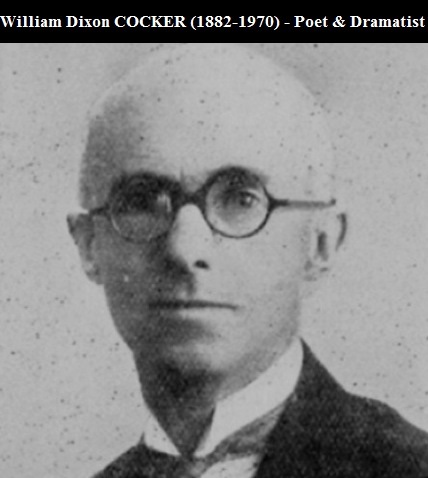
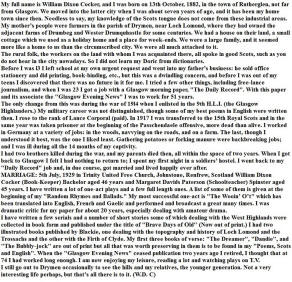

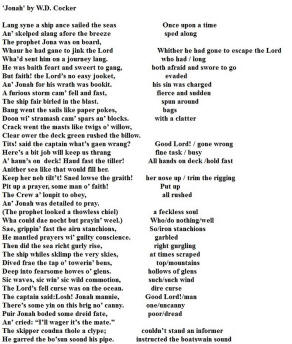
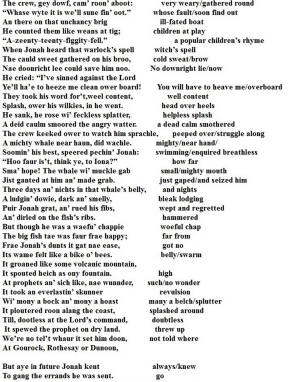
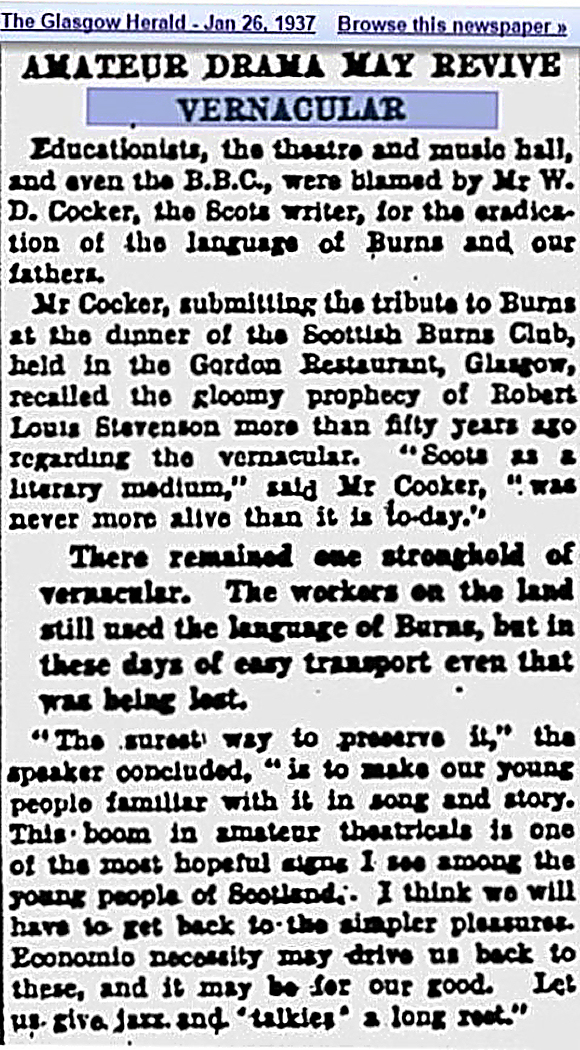
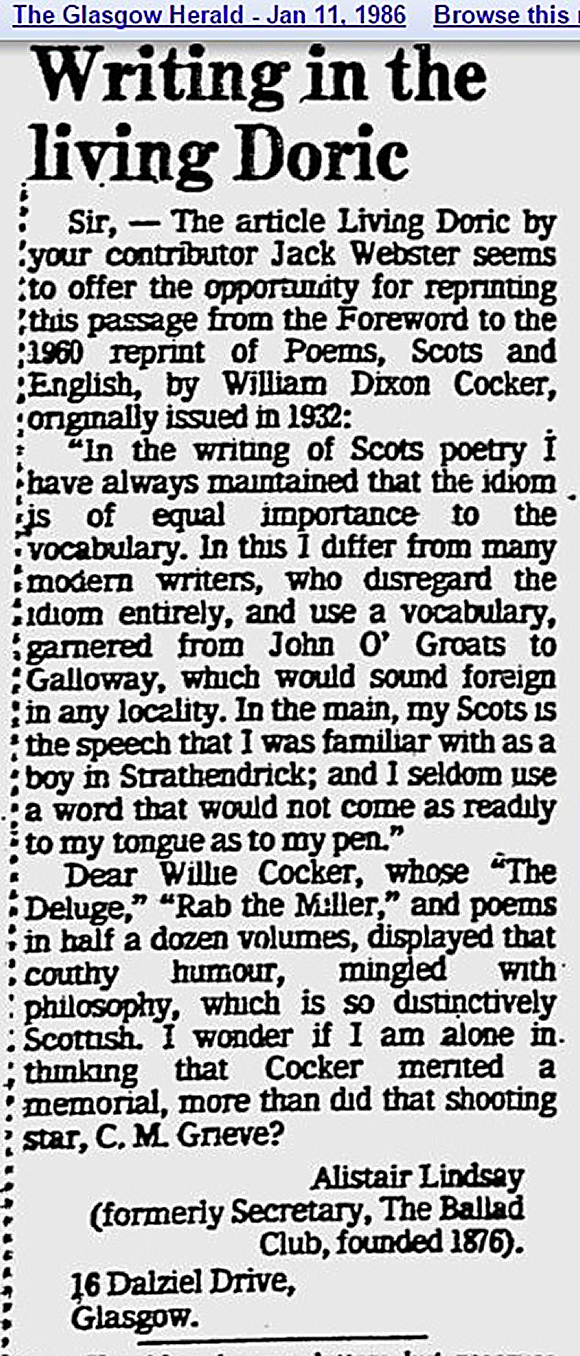
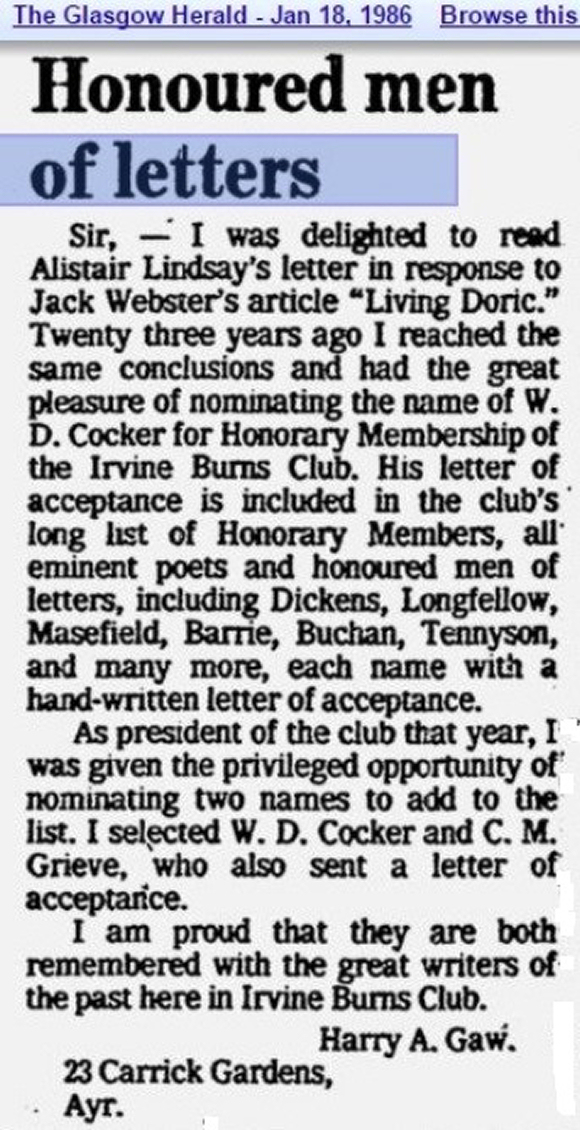
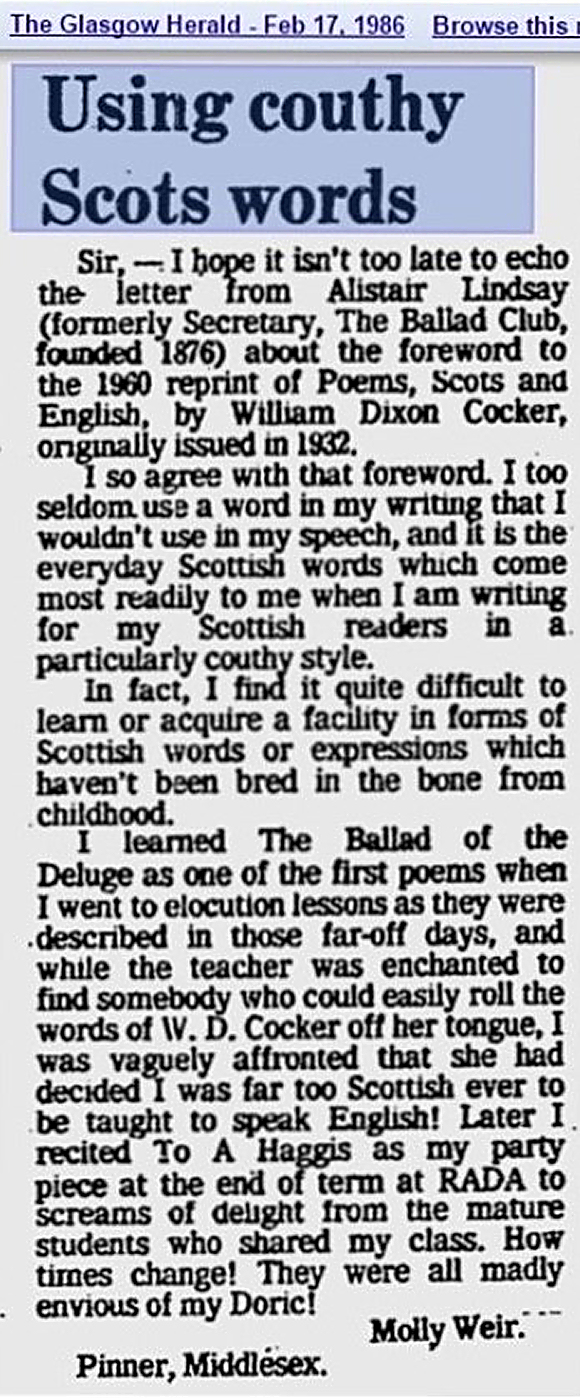
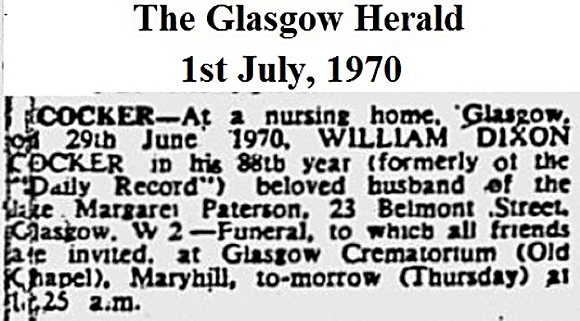
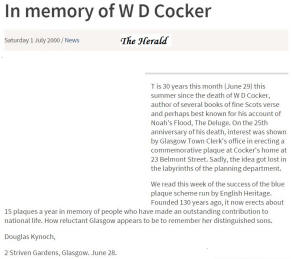
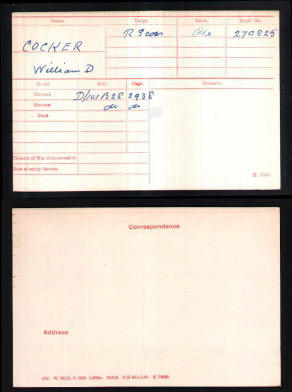
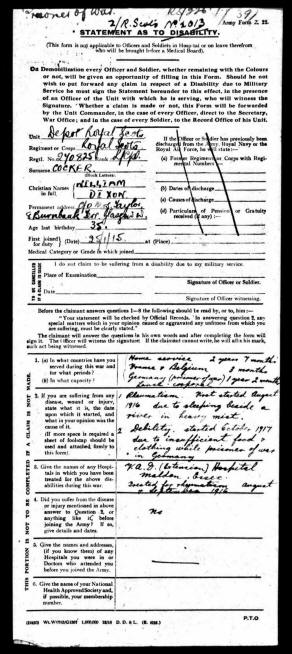
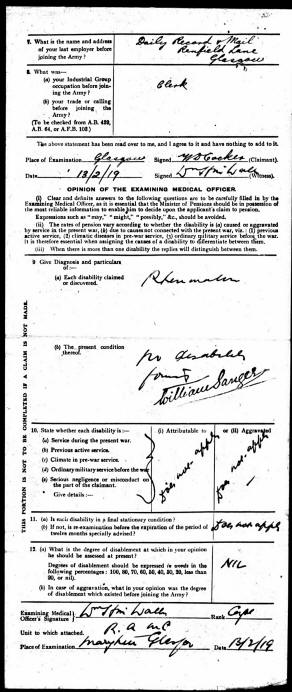
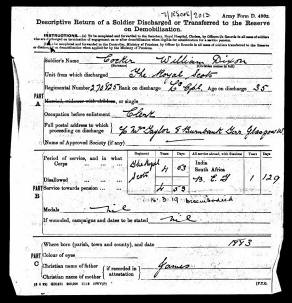
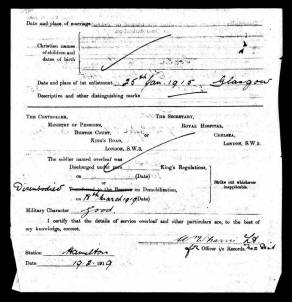
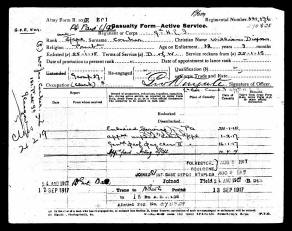
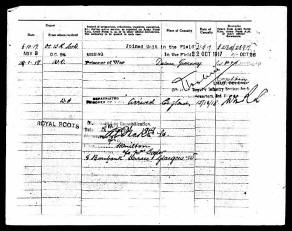
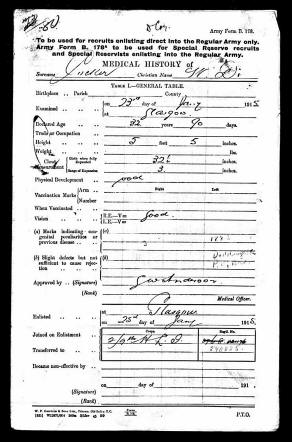
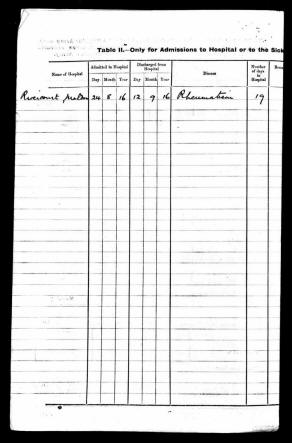
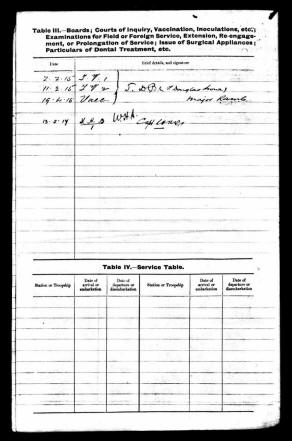 |

